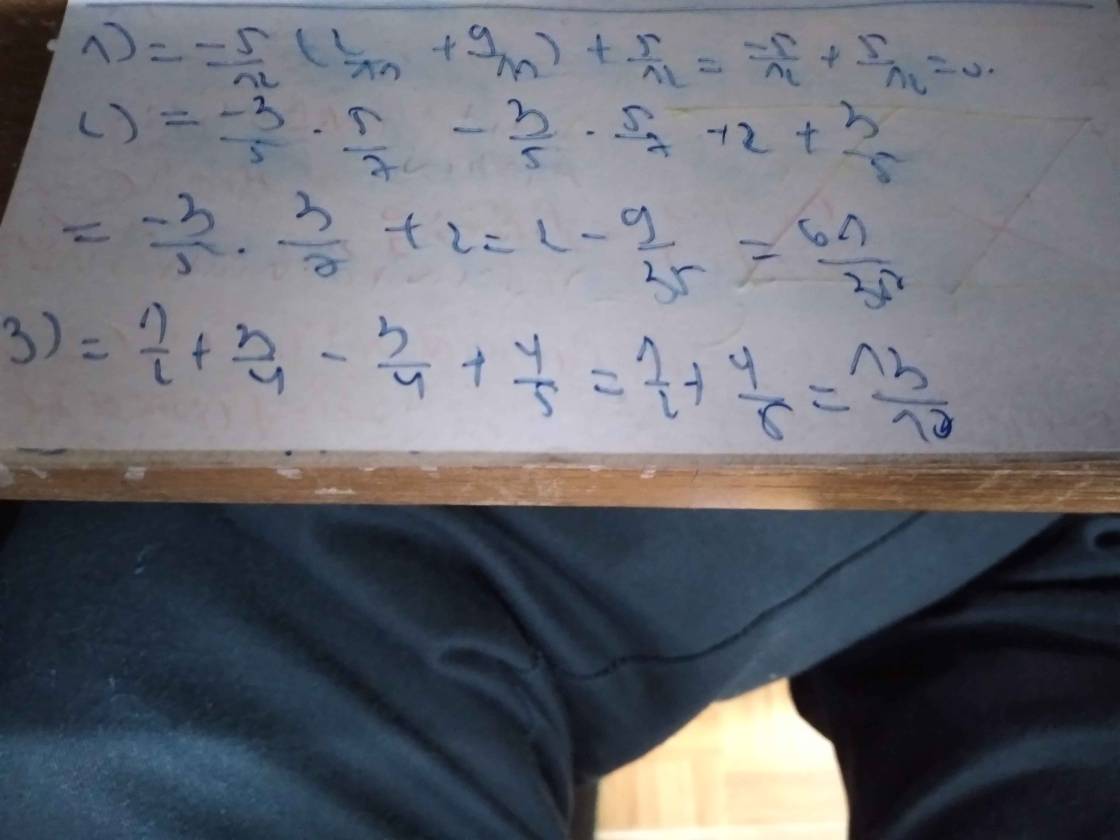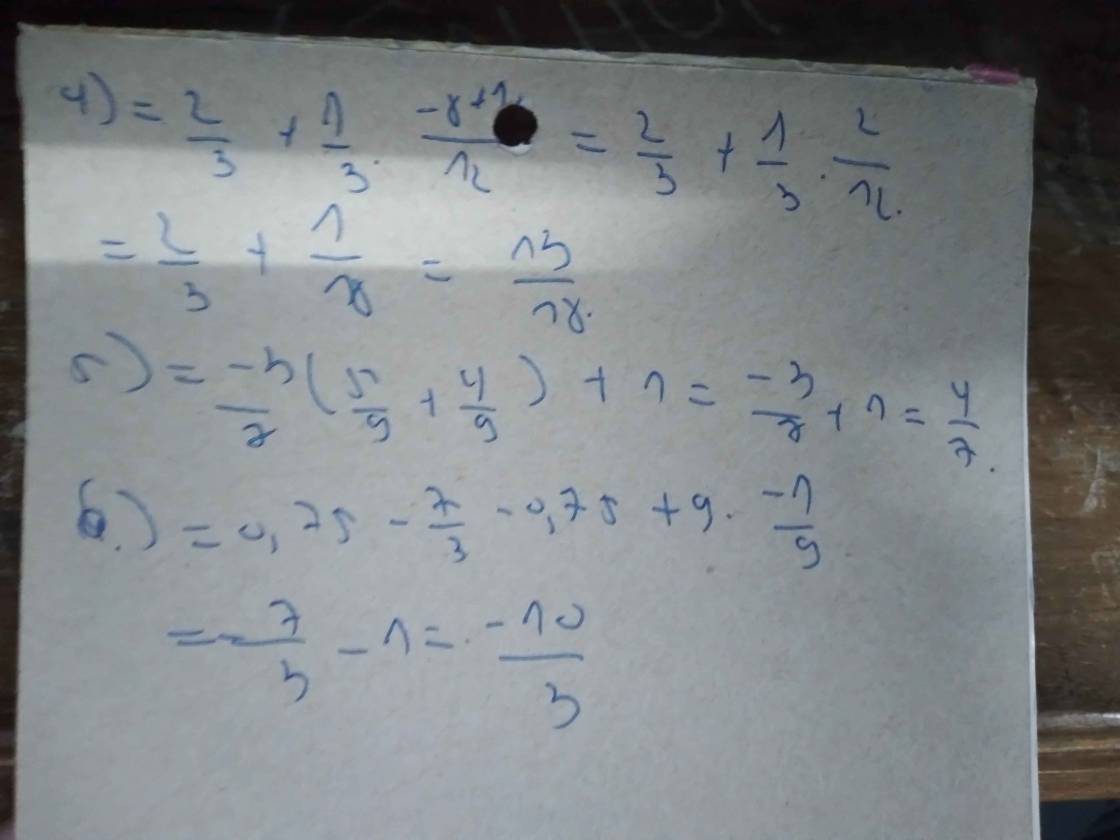2/5 x 1/2 : 1/3. 2/9 : 2/3 x 1/2
H24
Những câu hỏi liên quan
1. x+1/x-1 - x-1/x+1 = 4/x2-1
2. x+2/x-2 + x/x+2 = 2
3. 2x/x-1 - 1/x+2 = 2
4. x/x2-25 - 1-x/x-5 = 1/x+5
5. x-1/x+2 - 9/x2-4 = -3/x-2
6. 3x-3/x2-9 - 1/x-3 = x+1/x+3
Xem chi tiết
1) ĐKXĐ: \(x\notin\left\{1;-1\right\}\)
Ta có: \(\dfrac{x+1}{x-1}-\dfrac{x-1}{x+1}=\dfrac{4}{x^2-1}\)
\(\Leftrightarrow\dfrac{\left(x+1\right)^2}{\left(x-1\right)\left(x+1\right)}-\dfrac{\left(x-1\right)^2}{\left(x-1\right)\left(x+1\right)}=\dfrac{4}{\left(x-1\right)\left(x+1\right)}\)
Suy ra: \(x^2+2x+1-\left(x^2-2x+1\right)=4\)
\(\Leftrightarrow x^2+2x+1-x^2+2x-1=4\)
\(\Leftrightarrow4x=4\)
hay x=1(loại)
Vậy: \(S=\varnothing\)
2) ĐKXĐ: \(x\notin\left\{2;-2\right\}\)
Ta có: \(\dfrac{x+2}{x-2}+\dfrac{x}{x+2}=2\)
\(\Leftrightarrow\dfrac{\left(x+2\right)^2}{\left(x-2\right)\left(x+2\right)}+\dfrac{x\left(x-2\right)}{\left(x-2\right)\left(x+2\right)}=\dfrac{2\left(x^2-4\right)}{\left(x-2\right)\left(x+2\right)}\)
Suy ra: \(x^2+4x+4+x^2-2x=2x^2-8\)
\(\Leftrightarrow2x^2+2x+4-2x^2-8=0\)
\(\Leftrightarrow2x-4=0\)
\(\Leftrightarrow2x=4\)
hay x=2(loại)
Vậy: \(S=\varnothing\)
Đúng 2
Bình luận (0)
a, [(x/x^2-25) - (x-5/X^2+5x)] : (2x-5/x^2+5x) + ( x/ 5-x)
b, [(9/x^3-9x) + (1/x+3)] : [(x-3/x^2+ 3x) - ( x/3x+9)]
c, (1/x-1) - (x^3-x/x^2+1) . [(x/x^2+1-2x) + (1/1-x^2)]
tìm x
a) X x 3/4 = 1/5 b) 3/7 x X = 2/5 c) 1/3 + 2/9 = 2/12 x X
d) 4/15 x X - 2/3 = 1/5 e) x : 1/7 = 2/3 f) 1/9 : x = 7/3 j) 1/4 + 5/12 = 8/3 : x
h) 7/4 : X - 1/2 = 1/5
a: x*3/4=1/5
=>x=1/5:3/4=1/5*4/3=4/15
b: x*3/7=2/5
=>x=2/5:3/7=2/5*7/3=14/15
c: 1/3+2/9=2/12x
=>1/6x=3/9+2/9=5/9
=>x=5/9*6=30/9=10/3
d: 4/15*x-2/3=1/5
=>4/15*x=2/3+1/5=10/15+3/15=13/15
=>4x=13
=>x=13/4
e: x:1/7=2/3
=>x=2/3*1/7=2/21
f: 1/9:x=7/3
=>x=1/9:7/3=1/9*3/7=3/63=1/21
j: 1/4+5/12=8/3:x
=>8/3:x=3/12+5/12=8/12=2/3
=>x=4
h: =>7/4:x=1/5+1/2=7/10
=>x=7/4:7/10=10/4=5/2
Đúng 2
Bình luận (1)
tìm X
1/4+2.(3.x-2/3)=1
(1/2+2X). (2x-3)=0
(4x-5).(5/4.x-2)=0
1/9-(2.x+1/2)mũ 2=0
9.(3x-1/2)mũ 2 =4
1/2.x+2/3.x-1=-10/3
X+1/12=-3/9
a) \(x=\dfrac{25}{72}\)
b)\(x=-\dfrac{1}{4}\)
\(x=\dfrac{3}{2}\)
c)\(x=\dfrac{5}{4}\) hoặc
x \(=\dfrac{8}{5}\)
d và e chịu vì mk kg giỏi lắm về mũ
f)\(x=-2\)
G)\(x=-\dfrac{5}{12}\)
Đúng 1
Bình luận (0)
Bài 1:thực hiện phép tính(hợp lí nếu có thể):1, -5/12 x 2/11 + -5/12 x 9/11 + 5/122, -3/5 : 7/5 - 3/5 : 7/5 + 2 3/53, 1/2+ 3/4 - ( 3/4 - 4/5)4, 2/3 + 1/3 x ( -4/9 + 5/6)5, -3/7 x 5/9 + 4/9 x -3/7 + ( - 2022) ^ 06,0,75 - ( 2 1/3 + 0,75) + 3 ^ 2 x ( -1/9)7, 2 6/7 x [(-7/5 - 3/2 : -5/-4) + ( 3/2)^2]8,2/7 + 5/7 x ( 3/5 - 0,25 ) x ( -2)^2 + 35%9, 1 13/15 x 0,75 - ( 11/20 + 25%): 1 2/510, ( -2,4 + 1/3 ) : 3 1/10 + 75% : 1 1/211.5/3 - 5/7 + 5/9 / 10/3 - 10/7 + 10/9
Đọc tiếp
Bài 1:thực hiện phép tính(hợp lí nếu có thể):
1, -5/12 x 2/11 + -5/12 x 9/11 + 5/12
2, -3/5 : 7/5 - 3/5 : 7/5 + 2 3/5
3, 1/2+ 3/4 - ( 3/4 - 4/5)
4, 2/3 + 1/3 x ( -4/9 + 5/6)
5, -3/7 x 5/9 + 4/9 x -3/7 + ( - 2022) ^ 0
6,0,75 - ( 2 1/3 + 0,75) + 3 ^ 2 x ( -1/9)
7, 2 6/7 x [(-7/5 - 3/2 : -5/-4) + ( 3/2)^2]
8,2/7 + 5/7 x ( 3/5 - 0,25 ) x ( -2)^2 + 35%
9, 1 13/15 x 0,75 - ( 11/20 + 25%): 1 2/5
10, ( -2,4 + 1/3 ) : 3 1/10 + 75% : 1 1/2
11.5/3 - 5/7 + 5/9 / 10/3 - 10/7 + 10/9
Xem thêm câu trả lời
√x^2-6x+9=3-x
x^2-1/2x+1/16=x+3/2
√x-2√x-1=√x-1-1
√9-4√5-√5=-2
Let's solve each equation step by step:
√(x^2 - 6x + 9) = 3 - xSquaring both sides of the equation, we get:
x^2 - 6x + 9 = (3 - x)^2
x^2 - 6x + 9 = 9 - 6x + x^2
The x^2 terms cancel out, and we are left with:
-6x = -6x
This equation is true for any value of x. Therefore, there are infinitely many solutions.
x^2 - (1/2)x + 1/16 = x + 3/2Moving all terms to one side of the equation, we get:
x^2 - (1/2)x - x + 3/2 - 1/16 = 0
x^2 - (3/2)x + 29/16 = 0
To solve this quadratic equation, we can use the quadratic formula:
x = (-b ± √(b^2 - 4ac)) / (2a)
In this case, a = 1, b = -3/2, and c = 29/16. Plugging in these values, we get:
x = (3/2 ± √((-3/2)^2 - 4(1)(29/16))) / (2(1))
x = (3/2 ± √(9/4 - 29/4)) / 2
x = (3/2 ± √(-20/4)) / 2
x = (3/2 ± √(-5)) / 2
Since the square root of a negative number is not a real number, this equation has no real solutions.
√(x - 2)√(x - 1) = √(x - 1) - 1Squaring both sides of the equation, we get:
(x - 2)(x - 1) = (x - 1) - 2√(x - 1) + 1
x^2 - 3x + 2 = x - 1 - 2√(x - 1) + 1
x^2 - 4x + 2 = -2√(x - 1)
Squaring both sides again, we get:
(x^2 - 4x + 2)^2 = (-2√(x - 1))^2
x^4 - 8x^3 + 20x^2 - 16x + 4 = 4(x - 1)
x^4 - 8x^3 + 20x^2 - 16x + 4 = 4x - 4
Rearranging terms, we have:
x^4 - 8x^3 + 20x^2 - 20x + 8 = 0
This equation does not have a simple solution and requires further calculations or approximation methods to find the solutions.
√9 - 4√5 - √5 = -2Simplifying the left side of the equation, we get:
3 - 4√5 - √5 = -2
-√5 - 5 = -2
-√5 = 3
This equation is not true since the square root of a number cannot be negative.
Therefore, the given equations either have infinitely many solutions or no real solutions.
Đúng 0
Bình luận (0)
Tính :
a) 13/15 + 4/7 - 101/105 b) 2/5 + 3/5 + x 4/9 c) 3/4 x 5/2 x 7/6
d) 1/2 : 1/4 - 2/9 e) 2/3 - 1/4 +2/9 g) 5/2 + 1/3 x 3/2
a: =91/105+60/105-101/105
=50/105=10/21
c: \(\dfrac{3}{4}\cdot\dfrac{5}{2}\cdot\dfrac{7}{6}=\dfrac{3}{6}\cdot\dfrac{7}{2}\cdot\dfrac{5}{4}=\dfrac{1}{2}\cdot\dfrac{7}{2}\cdot\dfrac{5}{4}=\dfrac{35}{16}\)
d: =2-2/9
=18/9-2/9
=16/9
e: =24/36-9/36+8/36
=23/36
g: =5/2+1/2
=3
Đúng 1
Bình luận (2)
1.giải các phương trình sau:
a, 3(2x+1)/4 - 5x+3/6 = 2x-1/3 - 3-x/4
b, 19/4 - 2(3x-5)/5 = 3-2x/10 - 3x-1/4
c, x-2*3/2+3 + x-3*5/3+5 + x-5*2/5+2 = 10
d, x-3/5*7 + x-5/3*7 + x-7/3*5 = 2(1/3 + 1/5 + 1/7)
2. giải các phương trình:
a, x-1/9 + x-2/8 = x-3/7 + x-4/6
b, (1/1*2 + 1/2*3 + 1/3*4 + ... + 1/9*10) (x-1) + 1/10x = x- 9/10
Câu 1 :
a, \(\frac{3\left(2x+1\right)}{4}-\frac{5x+3}{6}=\frac{2x-1}{3}-\frac{3-x}{4}\)
\(\Leftrightarrow\frac{6x+3}{4}+\frac{3-x}{4}=\frac{2x-1}{3}+\frac{5x+3}{6}\)
\(\Leftrightarrow\frac{5x+6}{4}=\frac{9x+1}{6}\Leftrightarrow\frac{30x+36}{24}=\frac{36x+4}{24}\)
Khử mẫu : \(30x+36=36x+4\Leftrightarrow-6x=-32\Leftrightarrow x=\frac{32}{6}=\frac{16}{3}\)
tương tự
\(\frac{19}{4}-\frac{2\left(3x-5\right)}{5}=\frac{3-2x}{10}-\frac{3x-1}{4}\)
\(< =>\frac{19.5}{20}-\frac{8\left(3x-5\right)}{20}=\frac{2\left(3-2x\right)}{20}-\frac{5\left(3x-1\right)}{20}\)
\(< =>95-24x+40=6-4x-15x+5\)
\(< =>-24x+135=-19x+11\)
\(< =>5x=135-11=124\)
\(< =>x=\frac{124}{5}\)
\(\frac{\left(x-2\right).3}{2}+3+\frac{\left(x-3\right).5}{3}+5+\frac{\left(x-5\right).2}{5}+2=10\)
\(< =>\frac{\left(x-2\right).3.15}{30}+\frac{\left(x-3\right).5.10}{30}+\frac{\left(x-5\right).2.6}{30}=10-2-3-5\)
\(< =>\frac{\left(x-2\right).45+\left(x-3\right).50+\left(x-5\right).12}{30}=0\)
\(< =>45x-90+50x-150+12x-60=0\)
\(< =>107x-300=0< =>x=\frac{300}{107}\)
Xem thêm câu trả lời
a, [(x/x^2-25) - (x-5/X^2+5x)] : (2x-5/x^2+5x) + ( x/ 5-x)
b, [(9/x^3-9x) + (1/x+3)] : [(x-3/x^2+ 3x) - ( x/3x+9)]
c, (1/x-1) - (x^3-x/x^2+1) . [(x/x^2+1-2x) + (1/1-x^2)]
Cần gấp ạ
1) 1/3 x 1/2 x 3/7 2) 5/4 x 1/3 + 1/7 3) 8 x ( 8/9-2/3 ) 4) 5/6 x 48/20 x 1/2 5) ( 2/5 + 3/4 ) x 8 6) 10 x ( 1/2-1/5 )
1) 1/3 x 1/2 x 3/7 = 1/6 x 3/7 = 1/14
2) 5/4 x 1/3 + 1/7 = 5/12 + 1/7 = 47/84
3) 8 x (8/9 - 2/3) = 8 x 2/9 = 16/9
4) 5/6 x 48/20 x 1/2 = 2 x 1/2 = 1
5) (2/5 + 3/4) x 8 = 23/20 x 8 = 46/5
6) 10 x (1/2 - 1/5) = 10 x 3/10 = 3
Đúng 0
Bình luận (0)







